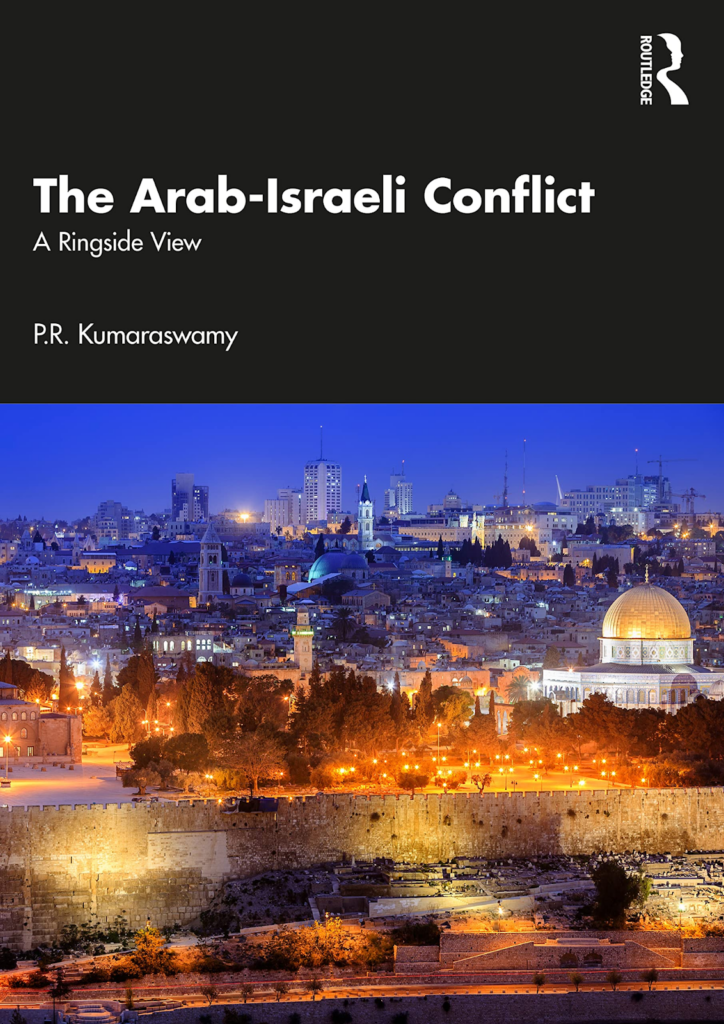
- The book provides a balanced, neutral, and highly accessible introduction to the Arab–Israeli conflict, simplifying complex historical, political, and religious dimensions without losing nuance.
- Its 26-chapter structure offers a comprehensive historical sweep from early origins and major wars to peace processes, while clearly explaining sensitive issues such as the significance of Jerusalem.
- A standout feature of the book is the detailed analysis of India’s evolving stance on the conflict, offering rare insight into India’s historical links, diplomatic shifts, and contemporary de-hyphenation policy.
- The book offers a clear, balanced, and highly readable account of the Arab-Israeli conflict, making complex historical and political issues accessible without oversimplifying them.
The Arab-Israeli Conflict: A Ringside View by Professor P.R. Kumarswamy offers one of the most accessible, balanced, and comprehensive introductions to the world’s most enduring geopolitical conflict. Kumarswamy, a leading Indian scholar of the contemporary Middle East and a professor at Jawaharlal Nehru University (JNU), brings to this work not only decades of academic expertise but also valuable on-ground experience from his years at the Harry S. Truman Research Institute in Jerusalem. His broader contributions, founding the Middle East Institute in New Delhi, editing Contemporary Review of the Middle East, and curating the Persian Gulf series, reinforce his authority on the subject.
This book is an essential read for anyone seeking a holistic and objective understanding of the Arab-Israeli conflict, its history, its nuances, and its deep-rooted political, religious, ethnic, and ideological dimensions. What makes it particularly compelling is the author’s ability to explain complex events through a clear, neutral, and engaging narrative. For readers unfamiliar with the region or its faith traditions, the author offers a simple yet powerful entry point, presenting the story with a clarity that feels like engaging storytelling. Once begun, the book is difficult to set aside.
A Comprehensive and Accessible Structure
Comprising 26 chapters, the book traces the conflict from its earliest origins to contemporary developments, each section grounded in well-defined timelines. Early chapters cover foundational events such as the Balfour Declaration, the Mandate period, the 1947 partition, the 1948 Arab-Israeli War, the 1956 Suez Crisis, the 1967 June War, and the emergence of Palestinian resistance. Through these discussions, the author enables the reader to gradually uncover the intricate layers that have shaped one of the world’s most debated conflicts.
Later chapters examine prominent turning points, including the Madrid Conference of 1991, the Oslo process, and subsequent diplomatic and political shifts. A dedicated chapter on Jerusalem stands out for its clarity in explaining why this city holds profound significance for multiple faiths, an issue often misunderstood or oversimplified.

India’s Perspective: A Valuable Contribution
Chapter 25 is particularly noteworthy, offering a rare, meticulously traced account of India’s evolving approach to the conflict. Starting with early Jewish presence on the Malabar Coast and moving through the Mughal period, the Khilafat movement, positions of Gandhi, Nehru, and Bose, and India’s debates in the UN General Assembly, the chapter then explores post-Cold War recalibrations and the normalisation of ties with Israel under Prime Minister Narasimha Rao. It concludes with India’s successful de-hyphenation policy, exemplified by Prime Minister Narendra Modi’s separate visits to Israel and Palestine. This chapter alone makes the book especially relevant for Indian readers.
A Ringside View-Balanced and Unflinching
True to its title, the book offers a “ringside view”, a vantage point that is close enough to capture the emotional gravity of the conflict, yet sufficiently detached to remain rational and balanced. Kumarswamy does not shy away from difficult questions or uncomfortable events. Instead, he frames the conflict through multiple lenses: time, religion, decolonisation, Cold War politics, Pan-Arabism, oil politics, refugee crises, identity politics, diaspora influences, and more. The result is a compelling demonstration of why the Israel-Palestine question has no single, universally acceptable solution.
For Indian readers in particular, the author’s use of familiar cultural references makes the book even more engaging. His humorous comparison of Jewish longing for Jerusalem to the impossibility of “carrying a place like Hanuman carrying a mountain” is one such example that brings complex emotional attachments into relatable perspective.
The Arab-Israeli Conflict: A Ringside View stands out as an engaging, balanced, and highly readable work that cuts through complexity without oversimplifying. It offers an excellent starting point for students, general readers, policymakers, and anyone seeking an informed, impartial, and nuanced understanding of the Arab-Israeli conflict. Kumarswamy’s scholarship, lucid writing, and ability to connect historical depth with contemporary relevance ensure that this book remains one of the most valuable introductions to the subject.
Book Title: The Arab-Israeli Conflict: A Ringside View
Author: P.R. Kumaraswamy
Publishers: Routledge Taylor & Francis Group
Pages: 295
Price: ₹1230 (Hardcover)
SW Ratings: ****1/2
Garima Sharma is a Master’s student in International Relations at Jawaharlal Nehru University. Her interests include public policy, international governance, geopolitics, defence, and security. Views expressed are the author’s own.
